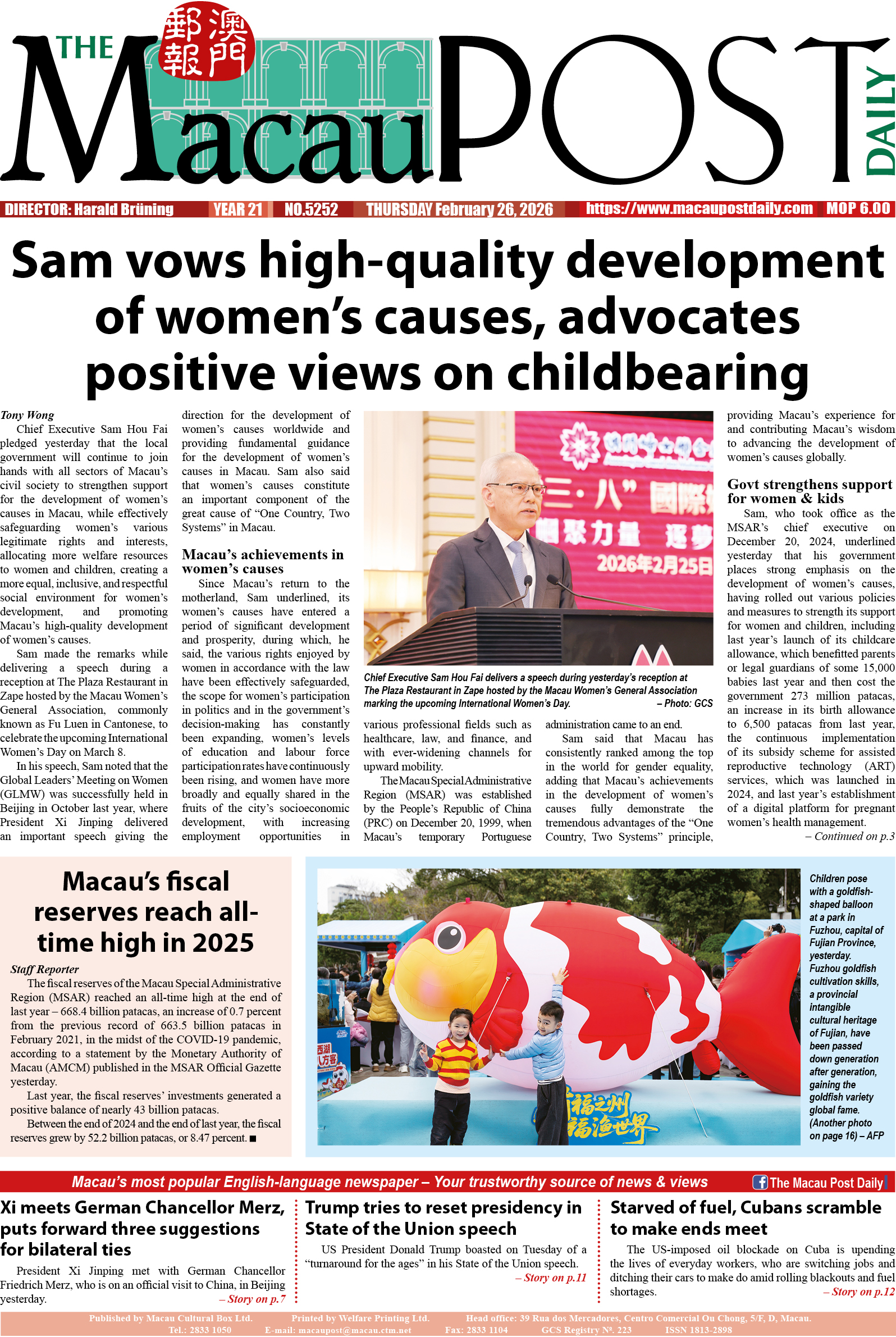The Health Bureau (SSM) said yesterday that the number of local teenagers smoking traditional tobacco “has reached a record low”, but the percentage of them using e-cigarettes has been rising, a situation which is a new challenge for the local government’s ongoing tobacco control campaigns.
A statement yesterday said that the bureau has completed its fifth and latest survey on local teenagers’ tobacco consumption.
According to the statement, the survey covered 1,820 students aged between 13 and 15 from 25 local schools.
According to the findings, the statement said, the percentage of teenagers aged between 13 and 15 smoking traditional tobacco decreased from 6.1 percent in 2015 to 3.8 percent last year, a “significant” drop of 2.3 percentage points.
However, the statement said, the findings show that teenagers’ use of e-cigarettes has been rising during the same period. Four percent of teenagers aged between 13 and 15 used e-cigarettes last year, an increase of 1.4 percentage points from 2015 when 2.6 percent of them used e-cigarettes.
Moreover, the findings also show that 16.1 percent of the students mistakenly thought that the use of e-cigarettes would help them quit smoking, while 19 percent said that they did not know whether the use of e-cigarettes would be helpful in giving up smoking.
The findings indicate that local teenagers in general lack knowledge of e-cigarettes’ harmful health effects, the statement said.
In addition, 34 percent of the students said they had noticed promotional information from the mass media campaigning against the use of e-cigarettes, a percentage lower than that of the students who said that they had noticed promotional information campaigning against traditional tobacco, the statement said.
Furthermore, 46.3 percent of the students said that they had been taught about e-cigarettes’ harmful health effects in school lessons, “significantly” lower than 69.9 percent of the students who said that they had been taught about traditional tobacco’s harmful health effects.
Exposure to second-hand smoke
The survey also asked students about their exposure to second-hand smoke.
According to the findings, 36.3 percent of the students said that they had been exposed to second-hand smoke in indoor venues and facilities last year, a percentage “similar to” 39.8 percent in 2015.
The findings show that 30.1 percent of the students said that they had been exposed to second-hand smoke at home last year, while the percentage was 30.3 percent in 2015.
Meanwhile, the statement also noted that nicotine contained in e-cigarettes would possibly make the human brain more likely to become addicted to other harmful substances. E-cigarettes can also be used as devices for taking drugs such as cannabis, the statement said.
The government has submitted a Tobacco Prevention and Control Law amendment bill to the Legislative Assembly (AL), which proposes to ban the import and export of e-cigarettes, in addition to the current ban on their sale in the city.
While the current version of the Tobacco Prevention and Control Law, which has been in force since January 2018, bans the sale of e-cigarettes in Macau, it does not ban their import and export.
The amendment bill, which was announced by the government last week, proposes to ban the manufacture, distribution, sale, import and export of e-cigarettes.
The legislature is yet to schedule a plenary session for the debate and vote of the amendment bill’s outline.
Branded as ‘fashionable products’
Yesterday’s statement said that over recent years “those who earn a profit” from e-cigarettes have branded such items as “fashionable products with less harmful health effects than traditional tobacco products”, a situation which has caused teenagers to get access to smoking, the statement said, adding that such teenagers are very likely to switch to smoking traditional cigarettes in the future.
The Health Bureau also noted that yesterday was World No Tobacco Day (WNTD), which was created by the World Health Organisation (WHO) in 1987.
The bureau held a meeting yesterday with community association representatives briefing them about the government’s tobacco control campaigns and its implementation of the Tobacco Prevention and Control Law.

Health Bureau (SSM) Director Alvis Lo Iek Long (centre), SSM Deputy Director Cheang Seng Ip (right) and Public Security Police (PSP) Deputy Commissioner Leong Heng Hong chair yesterday’s closed-door meeting with community association representatives about the government’s tobacco control campaigns. Photo: SSM







